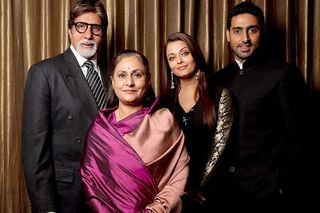Aishwarya, Abhishek, and the Glorification of the Indian Joint Family
“Aishwarya and Abhishek Bachchan Will Never Move out of Jalsa” screamed the headlines. “Why do I care? And whose business is it besides theirs, you patriarchal twits?” I screamed back. Unfortunately, webpages canno...

“Aishwarya and Abhishek Bachchan Will Never Move out of Jalsa” screamed the headlines. “Why do I care? And whose business is it besides theirs, you patriarchal twits?” I screamed back. Unfortunately, webpages cannot hear us (yet). And, thus, a rant was born.
In 2009, Oprah Winfrey visited India to the flashing of many camera bulbs. In a chat with Abhishek and Aishwarya Rai Bachchan, she asked the couple about living with his parents and, “How does that work?” Abhishek turned the question back on her, asking Oprah how it worked when she lived with her family – not really addressing the real issue, which was: Why, as obscenely rich adults, in a 21st century world, would you not rather live independently?
For years, India has staunchly believed in the ideal — nay, virtue — of a joint family, sort of like a wedding cake, with layers of generations, combined finances, possibly combined family income or source of income, the icing of multiple caretakers for children and a patriarch and matriarch cake topper.
The subcontinent is still primarily an agrarian country, and joint families meant more hands to till the land and make a living. Adults divided other household tasks between themselves, and children grew up with an adult always in shouting (at them, presumably) distance and with loads of playmates (thus saving on toys; it was always dress-your-little-brother-up-as-a-girl day). This also meant that if something went wrong, you wouldn’t be alone; the family would take care of you.
This wasn’t just India: multi-generational families living together existed and still exist across Asia, Africa, the Middle East, Latin America, Australian Aboriginals, and even East and South Europe. Italy even turned it into a business model – The (mafia) Family. In India today, traditional families, especially in the Marwari and Gujarati communities, are still joint family-oriented, the latter often featured in any number of television serials that probably play on loop in purgatory.
But while the basis of joint families was thus most likely security, income or finance, as is usual in India, the actual rationale behind a practice was lost in the mists of time and then ascribed to culture, religion or social pressure. Which turned the joint family from a safety net into a sort of rigid, suffocating system — one where married couples, young or otherwise, and their children, felt the intense lack of autonomy, privacy or harmony. More horrifyingly, like in the case of dowry deaths or harassment, this also meant that multiple generations of a family ganged up against one or more members, usually a woman.
In a joint family system, the policing starts with the women. The oldest male (or female) relative dictates what time women must come home. Or which of them cooks. Or what must be cooked. Or who they should marry. It is common practice, even today, for many daughters-in-law to be veiled, and shamed if their father-in-law or another male, elder relative sees their face. Which prompts the aneurysm-inducing outburst of: Then why bloody live together, pardon my French?
Of course, the Bachchans don’t live like this, and the joint families of today look different than their origins. Today, India is rapidly becoming more urban-centric (the advantages and benefits of which may be debatable depending on your viewpoint), and cities are said to be nuclear-family oriented. The men work, the women work, the men take decisions, the women take decisions, everyone likes to go out for movies and dinner and wake up late on weekends – all practices not usually associated with joint family thinking.
But like a virus, the joint family survives. In the period between 2001 and 2011, urban centres saw a 29% increase in joint families – whether two generations living together or siblings or what have you. There are admittedly many reasons for this – perilously high rents, high costs of living, lack of childcare, 24/7 work lives, social isolation, and more. None of those reasons, however, are or should be “right” or “culture.
Which is why this kind of inane-cultural-reinforcement through celebrity news is infuriating. Why ‘should’ Ash and Abhi, or any other couple, live in a joint family with caketoppers? Why not with Aishwarya’s, or the girl’s parents? Why aren’t the headlines reading, “It’s all ok folks; Ash-Abhi will still live in a family home – their own,” or “Amit-Jaya heave sigh of relief as spongy kids leave”? Why aren’t we saying, “Ash-Abhi do exactly as they please – and so should you”?
Akhila Vijaykumar is a writer with experience across advertising and journalism. Occasionally, the crossover does make her demand truth from soap and try to cajole quotes into starbursts, but no harm no foul. She loves books by Terry Pratchett, dogs and pizza, often at the same time.